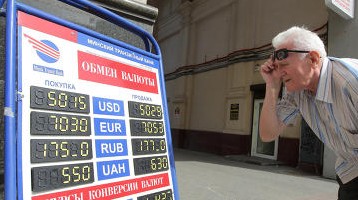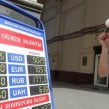
Inflation Plagues Belarusian Economy
Publication: Eurasia Daily Monitor Volume: 8 Issue: 177
By:

The Russian Ministry of Economic Development has issued a bleak prognosis for the economic future of Belarus, anticipating that the country will enter a period of recession in 2012, which will be followed by gradual recovery in future years (www.naviny.by, September 24). The report contrasts with a statement a few days earlier by Belarusian Deputy Prime Minister Syarhey Rumas, who suggested that the Belarusian economy had grown by 9.1 percent between January and August as compared to the same period in 2010 (Bloomberg, September 21).
Such ambiguities pertain not only to economic forecasts but also the currency situation. The Belarusian ruble rebounded sharply following its catastrophic fall against the dollar after its flotation on the international currency exchange, rising to BR 7,890 to the dollar, having exceeded BR 8,500 one week earlier. However, the future path is uncertain, and according to a prominent economist – Leonid Zlotnikov – the National Bank of Belarus needs to build up supplies of hard currency before it can intervene to strengthen the ruble over the long term (BDG Delovaya Gazeta, September 20). In short, the currency situation remains highly unstable.
The most recent International Monetary Fund assessment is not quite as dire as that of the Russians’: Belarus’ GDP may grow by 5 percent in 2011, and then will likely drop to 1.2 percent to 1.4 percent next year. However, the key issue is inflation of prices, which is bringing considerable hardship to the population. The IMF estimates that inflation will reach 65.3 percent in Belarus in 2011, as opposed to its earlier forecast of 57.2 percent (Belorusy i Rynok, September 19-25). On September 20, when the Ministry of Economy’s decree No. 153 came into effect, prices of bread and dairy products rose by 10 percent, and for beef and pork by 20 percent. In the first three weeks of September alone, consumer prices were up by 10.5 percent – an increase of almost 70 percent compared to December 2010. Over that same period, the price of vodka rose by 31 percent, and price rises between 4 percent and 20 percent have been registered for virtually every product, even for public transport, long immune to price inflation, which rose by 6.3 percent (www.naviny.by, September 24; www.telegraf.by, September 20).
On September 21, shoppers in Minsk discovered that the price of cigarettes had risen by 50 percent overnight, and meat and bread prices were about 20 percent higher than on the previous day (Focus Information Agency, September 21). The Belarusian authorities lay the blame on international pressure, and the attempts to isolate the Belarusian regime as a result of its continuing pressure on political opposition, most specifically the imprisonment of numerous high-profile political prisoners, including three former presidential candidates. However, according to an IMF report, the Belarusian leadership is responsible for the current economic predicament.
The statement from the IMF Executive Board was a response to a request from Belarus for a major loan of up to $8 billion to alleviate its cash flow problem and dwindling reserves. The IMF ignored political aspects and focused solely on what it termed the “weak macro-economic policies” applied by the Lukashenka regime and its lack of major structural reforms. It recommended the application of rigorous policies, including wage cuts, to be offset by a safety net for those most affected. It advocated price liberalization and the need for privatization. However, the IMF is not yet committed to providing another major loan for Belarus, ostensibly because of its dissatisfaction with the way the first one was frittered and the obvious lack of reforms to the largely command economy to date (www.telegraf.by, September 21).
Around the same time in Minsk, President Alyaksandr Lukashenka held a meeting with Wu Bangguo, Chairman of the Standing Committee of the National People’s Congress of China, which reportedly resulted in an offer from China to develop a new partnership with Belarus, and to immediately provide a loan of $1 billion to assist Belarus’ balance of payments problems (www.law.by, September 19). Further payments may also be in the offing from China, which has consented to construct a paper factory, communications satellite and hotel in Minsk, according to one report, prompting deputy chairman of the National Bank of Belarus, Taras Nadolny, to state that his country may be able to do without aid from the IMF (The Moscow News, September 19). Earlier it was reported that Belarus might add a $1 billion loan from Russia’s Sberbank to its potash company Belaruskali to its international exchange reserves (RIA Novosti, September 14).
On September 22-25, the annual meeting of the IMF and World Bank was held in Washington, but Nadezhda Yermakova, the newly appointed chair of the National Bank of Belarus, did not attend. There are various accounts as to why, but either she was denied a visa or else her visa was held up for bureaucratic reasons, and the Belarusian foreign ministry laid the blame on the United States for Yermakova’s inability to attend (www.charter97.org, September 22; www.telegraf.by, September 22).
Her absence highlights a key problem for official Belarus, namely the ostracizing of the Lukashenka regime by the West. Economic analysts maintain that the government’s debts necessitate the acquisition of $3 billion in foreign loans by the end of the year (Reuters, September 22). But while the West debates further economic sanctions on major Belarusian companies, and the Russians savor the growing problems of a needy neighbor and covet its most valuable assets, Lukashenka vacillates, alternatively sounding cooperative and defiant toward the international community, often on the same day.
The Chinese loan has ensured that he has some breathing space, and the IMF’s account of the causes of his problems is notably absent from the official media. However, the spiraling inflation, potential wage cuts, and the huge devaluations in the value of the ruble (on January 1, 2009 it was valued at BR 2,200 to the dollar) are a recipe for social discontent, particularly if heating costs also rise in the fall as anticipated. The president, who perceives himself as the sole arbiter of the fortunes of 9.5 million people, appears to have no ready solutions.




